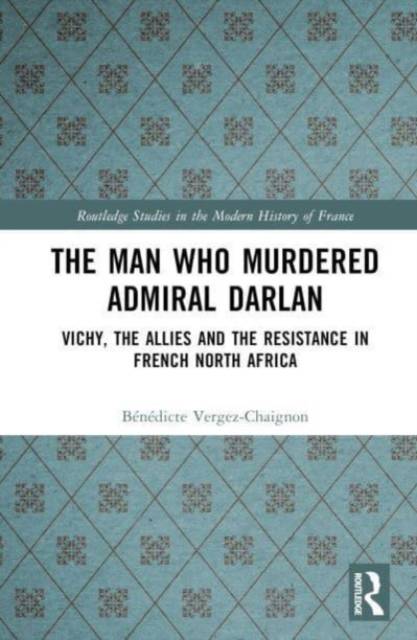
- Retrait gratuit dans votre magasin Club
- 7.000.000 titres dans notre catalogue
- Payer en toute sécurité
- Toujours un magasin près de chez vous
- Retrait gratuit dans votre magasin Club
- 7.000.0000 titres dans notre catalogue
- Payer en toute sécurité
- Toujours un magasin près de chez vous
The Man Who Murdered Admiral Darlan
Vichy, the Allies and the Resistance in French North Africa
Bénédicte Vergez-ChaignonDescription
In November 1942 Anglo-American forces landed in French North Africa, which soon afterwards broke with Marshal Pétain's Vichy regime in France and re-entered the war on the Allies' side. On Christmas Eve the high commissioner Admiral François Darlan was assassinated in Algiers. Why? Like the press and public opinion in Britain and America, General Charles de Gaulle's Free French movement and the resistance in France were appalled that the Allies had allowed Darlan to retain office, even though as prime minister under Pétain he had previously advocated military collaboration with Nazi Germany. Few mourned Darlan's death, many were relieved, some were jubilant.
His killer was Fernand Bonnier de la Chapelle. Who was this twenty year old and what drove him to murder? Bénédicte Vergez-Chaignon paints a sympathetic portrait of the young idealist manipulated by local resistance leaders. As she tells Bonnier's story, the author illuminates the imbroglio of North Africa's competing political forces. She traces Bonnier's short life, the assassination, his court-martial and execution within 48 hours, the subsequent judicial investigations which became bogged down in the complex rivalry between the Allies, the remnants of the Vichy regime, the Resistance and other factions. The story ends with Bonnier's posthumous rehabilitation and recognition as a member of the French Resistance.
Bonnier's biography reads like an absorbing novel, with its twists and turns, reconstructed dialogue and author's acute observations. As well as being a tragic human story, It is an illuminating study of the convoluted political context of the affair, which will be unfamiliar to some Anglophone readers. It is an academically rigorous piece of original research, based in part on previously inaccessible family archives.
The book has been translated into English by Richard Carswell.
Bénédicte Vergez-Chaignon's story of Darlan's assassination was received in France as
* 'a shocking book and a historian's great work' (Le Patriote Résistant)
* 'a detailed enquiry ... bordering on a detective novel which brings out the conspiratorial atmosphere reigning in Algiers in the wake of the Allied landing of 8 November 1942' (Le Monde des Livres)
* it 'shows the extent to which the 1940s were years of complete ambiguity' (Le Figaro Littéraire)
* 'Bénédicte Vergez-Chaignon, a meticulous historian, paints the portrait of a young idealist dying to wash away the stain of defeat' (Midi Libre).
Spécifications
Parties prenantes
- Auteur(s) :
- Editeur:
Contenu
- Nombre de pages :
- 222
- Langue:
- Anglais
- Collection :
Caractéristiques
- EAN:
- 9781032520988
- Date de parution :
- 31-07-23
- Format:
- Livre relié
- Format numérique:
- Genaaid
- Dimensions :
- 156 mm x 234 mm
- Poids :
- 498 g

Les avis
Nous publions uniquement les avis qui respectent les conditions requises. Consultez nos conditions pour les avis.






